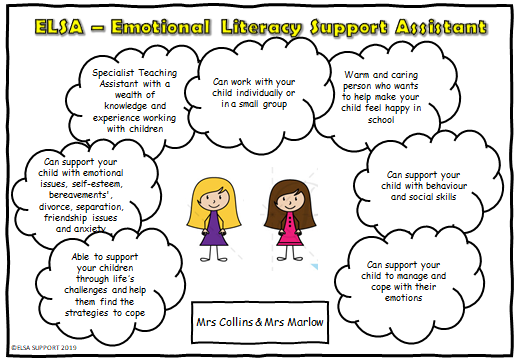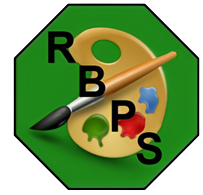ELSA Emotional Wellbeing
Hello - Welcome to our ELSA page
What is ELSA?
- An ELSA in a school is an Emotional Literacy Support Assistant. There is a recognised training course aimed specifically at Teaching Assistants or other specialist school roles.
- ELSAs are specialists with a wealth of experience of working with children and young people.
- ELSAs are trained and regularly supervised by Educational Psychologists.
- ELSAs are warm, kind and caring people who want to make children and young people feel happy in school and to reach their potential socially, emotionally and academically.
- They understand the barriers to learning that some children and young people might have and can help them with this.
- They can support the children and young person’s emotional development and help them cope with life’s challenges. ELSAs will also help children and young people to find solutions to problems they might have.
Scope of practice
- It is important that ELSAs work within their scope of practice and only cover things they are trained to cover.
- Any concerns out of their scope of practice should be discussed with their Educational Psychologist and potentially referred on to outside agencies.
- An ELSA is not there to fix problems but to help them find their own solutions and offer that important support to a child or young person.
- ELSA is about creating a reflective space for the child or young person.
What areas does an ELSA help with?
- Loss and bereavement
- Emotional Literacy
- Self-esteem
- Social Skills
- Friendship issues
- Relationships
- Managing strong feelings
- Anxiety and worries
- Bullying
- Conflict
- Emotional Regulation
- Growth Mindset
- Social and therapeutic stories
- Problem solving
How are children or young people referred for ELSA?
- Class teacher referral
- Senco referral
There is often a waiting list, so children may be put on a waiting list until a slot becomes available. However, sometimes things happen in life such as a death, divorce, illness, hospital stay, and so on. An ELSA can help the child or young person reactively which means they can support them immediately when things like this happen. Through a strong relationship with the ELSA, the child or young person can feel safe and cared for and know that someone is there for them. Reactive support is very much about active listening.
How long should an ELSA Intervention last?
- ELSA intervention should be a short term focus intervention with clear aims- usually half a term to a full term in length.
- The vast majority of ELSA sessions are proactive. This means that there are targets for the ELSA to achieve with the child or young person. This makes the intervention measurable so the school knows the child or young person has made progress and the intervention has been successful. The targets are known as SMART – specific, measurable, achievable, realistic and time limited.
- It is helpful to measure data prior and post intervention to ensure the child or young person has progressed or to see what the next steps might be.
- Once the target has been set an ELSA can plan a series of sessions for that child to help them achieve their target. This might be a one to one session or a group session. The usual intervention is 6 sessions (half a term) but it could be a little longer if necessary.
- It is important the child or young person doesn’t become too attached and reliant on the ELSA because the aim for most children or young people is to cope independently with any challenges that they face.
Parent Communication
Whilst permission isn’t needed to run a school-based intervention with children, it is important to work with parents and inform them. Children or young people can make so much more progress when the parent and ELSA work together. Perhaps the parent can continue the learning outside of the session eg. practising coping strategies when the child has big emotions.

What do children say about ELSA?
“Thank you for taking time to talk things through”
“Thank you for helping me to make the right decision”
“I am learning to express my feelings”
“I like it in The Snug – you can trust everybody”
“I like talking to Mrs Marlow”
“Thank you for helping me to build my confidence”
“Thank you for always being there to listen”
“The Support is simply amazing”
“I feel safe in The Snug”
Jump Back Up July
Let's find ways to bounce back up!

